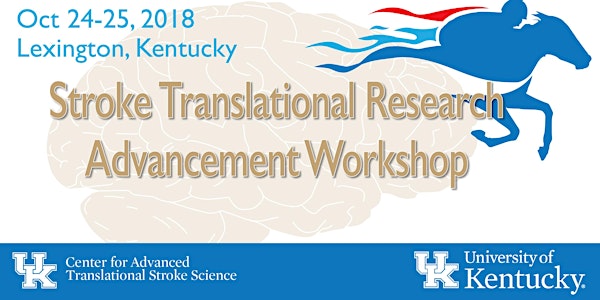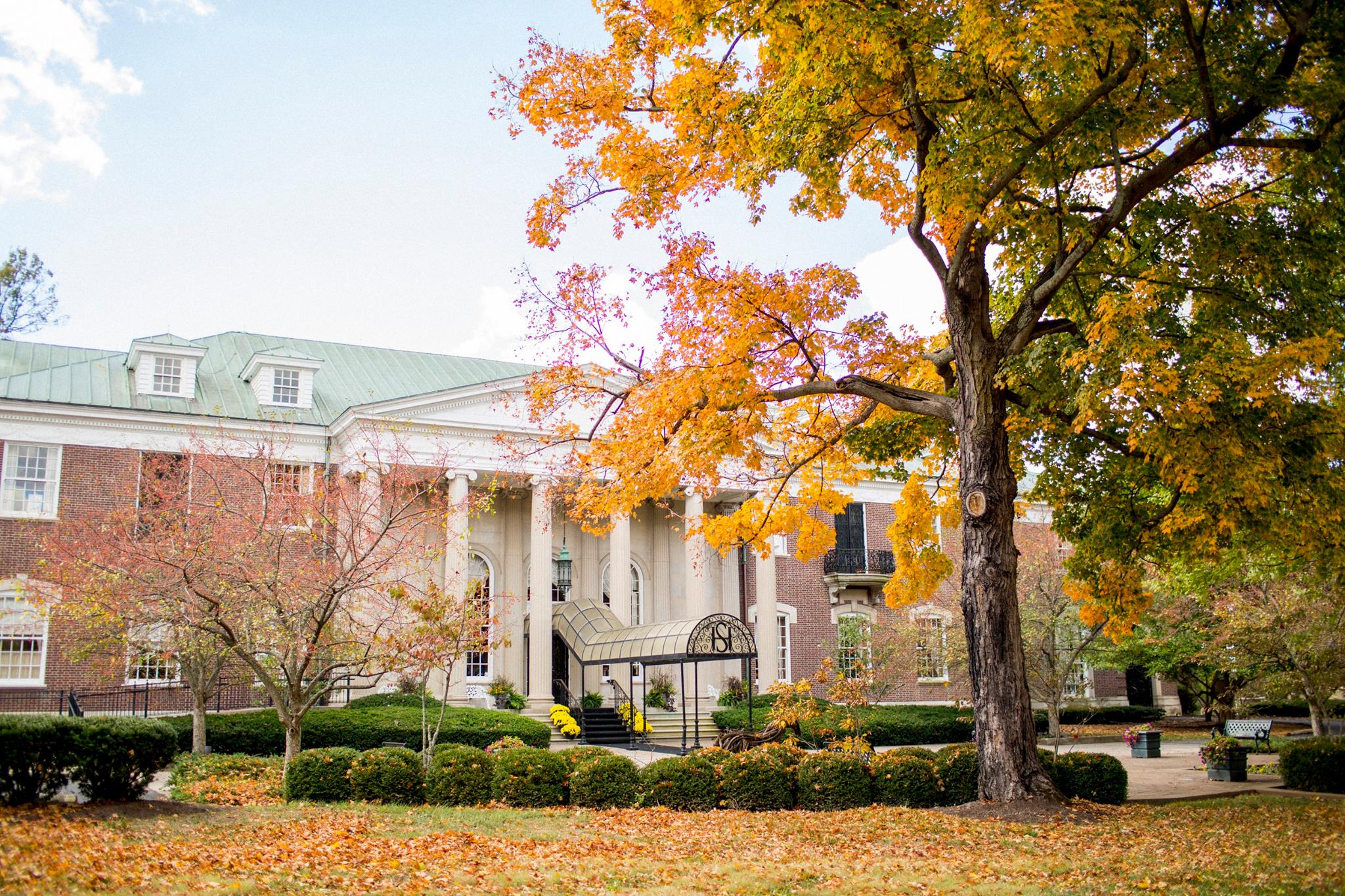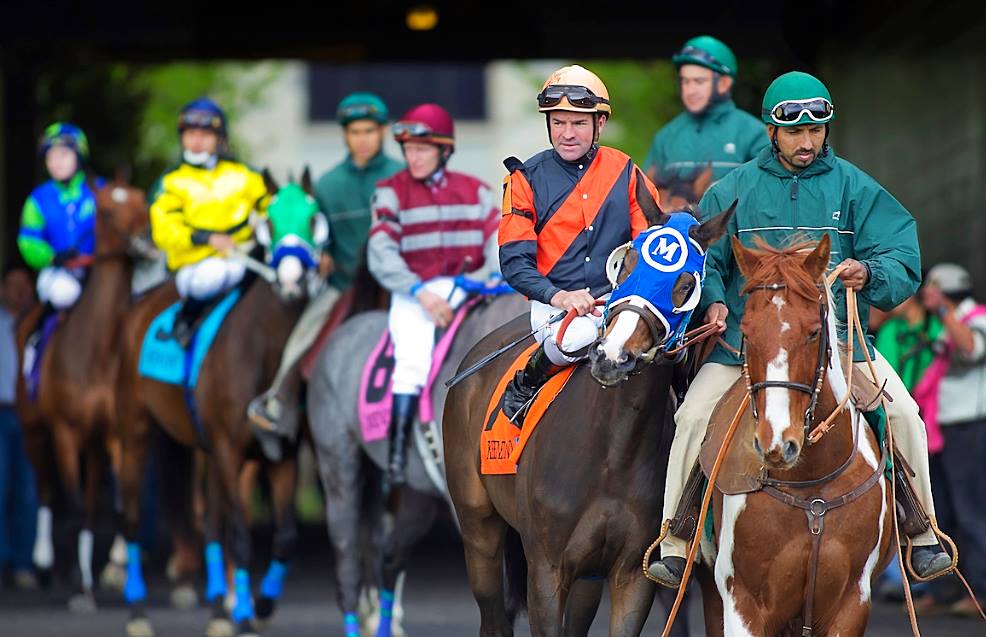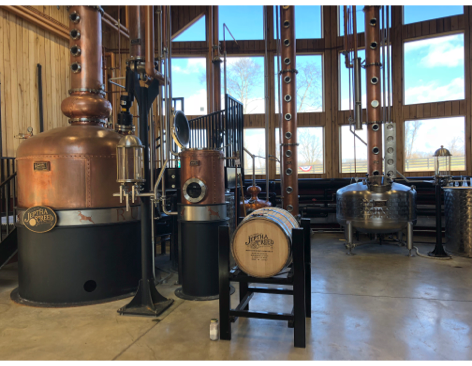
STRAW 2018 - Stroke Translational Research Advancement Workshop
Date and time
Location
Spindletop Hall
3414 Iron Works Pike Lexington, KY 40511Refund Policy
Description
 After a successful inaugural workshop, the second annual Stroke Translational Research Advancement Workshop (STRAW) will commence on October 24th, 2018. As with last year’s workshop, eminent clinical and basic stroke researchers will be presenting the most recent advancements in the area of translational research. Besides the presentations, this workshop offers a moderator-led open discussion airing the issues in this research area, and providing opportunities to share ideas and obtain expertise in stroke translational research development. There will be participant workgroups focusing on major issues in translational research, with the goal to draft publications for sharing findings and recommendations. Finally, the agenda provides ample opportunity to network with fellow national and international stroke researchers, with the goal to generate long-lasting collaborative relationships to propel the science and treatment of stroke into new innovation and development. Based on feedback from last year, meeting attendance is being capped so please register early to ensure your spot is confirmed! Please note that there are two options under the green "register" tab. By selecting the first option, you will register for the workshop and if you want to participate in the optional excursion, you must also select that option.
After a successful inaugural workshop, the second annual Stroke Translational Research Advancement Workshop (STRAW) will commence on October 24th, 2018. As with last year’s workshop, eminent clinical and basic stroke researchers will be presenting the most recent advancements in the area of translational research. Besides the presentations, this workshop offers a moderator-led open discussion airing the issues in this research area, and providing opportunities to share ideas and obtain expertise in stroke translational research development. There will be participant workgroups focusing on major issues in translational research, with the goal to draft publications for sharing findings and recommendations. Finally, the agenda provides ample opportunity to network with fellow national and international stroke researchers, with the goal to generate long-lasting collaborative relationships to propel the science and treatment of stroke into new innovation and development. Based on feedback from last year, meeting attendance is being capped so please register early to ensure your spot is confirmed! Please note that there are two options under the green "register" tab. By selecting the first option, you will register for the workshop and if you want to participate in the optional excursion, you must also select that option.
Spindletop Hall
PRELIMINARY AGENDA
Day 1 – Oct 24th
0800-0830 Registration, Continental Breakfast, and Welcome Remarks (Bix/Pennypacker)
0830-0915 The year that was: Clinical and scientific advancements in translational stroke in 2018 (John Zhang)
0915-1015 The Holy Grail? Revascularizing the ‘completed stroke’ and opening the door to neuro-reparative therapy (Sameer Ansari)
1015-1030 Coffee Break
1030-1130 Age and gender in translational stroke research- how to leverage our differences for more impactful science (Farida Sohrabji)
1130-1230 So you want to be a translational stroke scientist? Lessons from the newly converted. (Anthony Parker)
1230-1345 Networking Lunch at Themed Tables
1400 Board Buses for Afternoon Activities
AFTERNOON DESTINATION ACTIVITY (optional)
More information can be found in the description under the "register" tab.
1430-1645 Afternoon at the races! Transport to Keeneland, a world class Thoroughbred horse racecourse.

1730-2100 Distillery tour/mixology class/dinner at Jeptha Creed, a unique craft distillery.

Day 2 – Oct 25th
0800-0830 Continental Breakfast and Announcements
0830-0930 IGNITE: Preclinical drug discovery to the clinic (Mary Ann Pelleymounter NIH/NINDS)
0930-1015 Building a House of Innovation: Developing a Robust Program for Stroke Translational Research as a Department Chair (Louise McCullough)
1015-1030 Coffee Break
1030-1200 Interactive Brainstorming – Moderator-led group discussions around questions/data/ideas presented by a handful of researchers (please indicate your interest in presenting at the checkout prompt).
1200-1315 Lunch seminar – How to translate science to therapy from Industry perspective
1315-1600 Workgroups for paper publication
- Participants are invited to remain for the afternoon to help draft possible publications from the Workshop.
- Groups will form around particular topics, discuss recommendations and concrete methods for moving the field forward.
-Writing groups will be formed to continue the work after the meeting.
The following subjects will be discussed in four workgroups:
-Aged Animals on a Budget...How?
-Stroke Clinical Trial Design-Failures vs. Successes (IMS III vs ELVO trials)
-Renaming Stroke Models for their Target Subtype
-Workflow for Field Diagnostic Point-of-Care Biomarker Development
A limited hotel block with a promotional rate has been secured with Embassy Suites, Lexington/UK Coldstream at 1801 Newtown Pike. It is important to confirm early as there are competing events in town! Embassy Suites provides a daily complimentary cooked breakfast, a complimentary manager’s reception each evening with drinks and snacks, and free wifi.
Booking Link: STRAW
Hotel: Embassy Suites, Lexington/UK Coldstream
Group Name: STRAW
Dates: Arrival 23 October, 2018, Departure 25 October, 2018
Transportation - complimentary shuttles will run both mornings from the Embassy Suites to Spindletop Hall (meeting venue). For those participating in the afternoon destination activity on October 24th, transportation is provided from Spindletop to both points of interest and returning to Spindletop and the Embassy Suites that evening. Transportation will be on your own for those not participating in the optional activity on the 24th to return to the hotel. Transportation after the meeting on the 25th is on your own. Lexington has cab, lyft and uber services.
Organized by
MD, PhD is an interventional neuroradiologist/neurointerventional surgeon at Northwestern Memorial Hospital, Associate Professor in the Departments of Radiology, Neurology and Neurosurgery, Northwestern University Feinberg School of Medicine. Dr. Ansari received his medical and doctoral degrees from Jefferson Medical College, Philadelphia, and went on to complete his Diagnostic Radiology residency at the University of Illinois Hospital, Chicago as well as Diagnostic/Interventional Neuroradiology fellowships at the University of Michigan Health System, Ann Arbor. Following faculty positions at the University of Michigan and University of Chicago as Director of the Neurointerventional Surgery program, he transitioned to Northwestern University in 2010. Dr. Ansari specializes in minimally invasive percutaneous and endovascular procedures of the brain, head/neck and spine. His clinical and basic science research interests are predominantly centered on MR imaging based patient selection to stratify risk of various neurovascular pathologies, particularly the molecular pathogenesis and inflammation imaging of intracranial atherosclerotic disease and acute ischemic stroke.Other clinical research interests have investigated the safety and efficacy of coated coils in the embolization of intracranial aneurysms, the role of intracranial stents in the treatment of distal cervical/intracranial dissections, quantitative 4D flow and functional MRI techniques in the assessment of intracranial aneurysms and arteriovenous malformations. Dr. Ansari is a nationally recognized academic interventional neuroradiologist. He has published numerous peer reviewed scientific papers, national guidelines, reviews and case studies; and has been awarded multiple industry, foundation, and NIH sponsored research grants. He actively participates in the peer review process of several neurointerventional and neurosurgery journals. He is an active member of the Society of Neurointerventional Surgery (SNIS), the American Society of Neuroradiology (ASNR), American University Radiologists (AUR), the American Roentgen Ray Society (ARRS), the Radiological Society of North America (RSNA) and the American College of Radiology (ACR). He serves on the Board of Directors of the SNIS as the Medical Director of the Neurovascular Quality Initiative (NVQI), the national neurointerventional data registry supported by the SNIS Patient Safety Organization and is currently the co-Chair of the Food and Drug Administration’s (FDA) Coordinated Registry Network (CRN) for Devices Used for Acute Ischemic Stroke Intervention (DAISI).
Louise McCullough is the Roy M. and Phyllis Gough Huffington Distinguished Chair and professor of neurology at McGovern Medical School at UTHealth and Chief of Neurology at Memorial Herman Hospital – Texas Medical Center. She is a physician-scientist and a practicing vascular neurologist with clinical expertise in sex/gender disparities, stroke prevention, stroke and aging, acute stroke treatments and outcome assessment. A renowned investigator, she is well recognized for her work in cerebral vascular disease and is known for her research identifying sex differences in cell death pathways during stroke, which are now been shown to be a major factor in the response to an ischemic insult. Working closely with the Society for Women's Health Research (SWHR) and the Office of Research on Women’s Health (ORWH), she was instrumental in the National Institute of Health’s requirement to include female animals in basic and translational studies. Among Dr. McCullough’s many honors and awards are the prestigious National Institute of Neurological Disorders and Stroke (NINDS) Javits Neuroscience Investigator Award and the Inaugural American Heart Association (AHA) Outstanding Stroke Research Mentor Award. Dr. McCullough completed her PhD in Neuroscience and medical degree from the University of Connecticut. She continued her training at Johns Hopkins and was a resident in neurology from 1996-2000. Her residency was followed by a fellowship in cerebrovascular disease and stroke (2000-2002). After completing her training, she joined the faculty at Johns Hopkins Hospital and began her translational research career. She became an Instructor and then an Assistant Professor in Neurology at Hopkins. She was supported by the American Heart Association, first as a fellow, then as a faculty member by a career development award and by the Hopkins sponsored Passano fellowship. This support was instrumental to her academic success, and the infrastructure and mentorship she received allowed her to successfully compete for her first RO1 grant. Dr. McCullough relocated to Connecticut in 2004 and over the next eight years rose to the rank of Professor in the Departments of Neurology and Neuroscience at The University of Connecticut Health Center and at the John Dempsey Hospital in Farmington, Connecticut. She became the Director of Stroke Research and Education at Hartford Hospital, and developed one of the largest stroke centers in New England. In 2015, she relocated to the University of Texas Health Science Center in Houston 2015 as the Chair of Neurology and Chief of the Neurology service at Memorial Hermann Hospital. She brought 24 members of her laboratory and clinical program with her and over the past three years has developed the Neurology Department at UT Health into one of the top twenty NIH-funded Neurology Departments in the country.
Farida Sohrabji, Ph.D., FAHA, is the Joseph Shelton Professor of Neuroscience and Associate Department Head of Neuroscience and Experimental Therapeutics at the Texas A&M College of Medicine. Dr. Sohrabji obtained a joint doctoral degree in Neurobiology & Biopsychology from the University of Rochester (Rochester, NY) and completed her post-doctoral training at Columbia University, College of Physicians and Surgeons (New York, NY). Dr. Sohrabji joined the faculty of Texas A&M College of Medicine in 1998, where she is actively involved in the training of graduate and medical students and mentorship of junior faculty. She directs a federally-funded research program that focuses on sex and age differences in cerebrovascular disease, specifically, biochemical and behavioral changes following stroke-related injury, including brain-immune interactions, profiling epigenetic biomarkers and identifying novel therapies for ischemic stroke. Dr. Sohrabji is the Founder and Director of the Women’s Health in Neuroscience Program at the Texas A&M College of Medicine, and a strong advocate for the inclusion of gender/sex differences in biomedical research. She is a past member of the NIH Advisory Council on Research on Women’s Health, and currently serves on NIH and AHA study sections, and the editorial boards of Frontiers in Neuroendocrinology and Neurochemistry International. In 2017, Dr. Sohrabji was selected as a member of the inaugural class of Texas A&M University Presidential Impact Fellows.